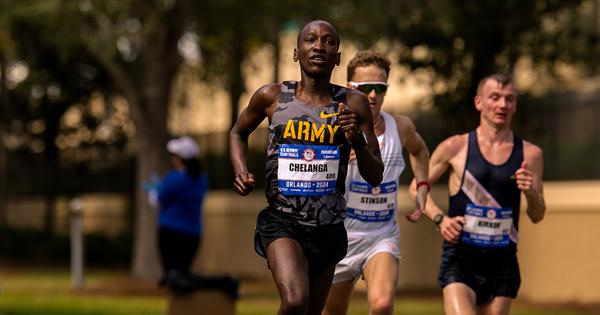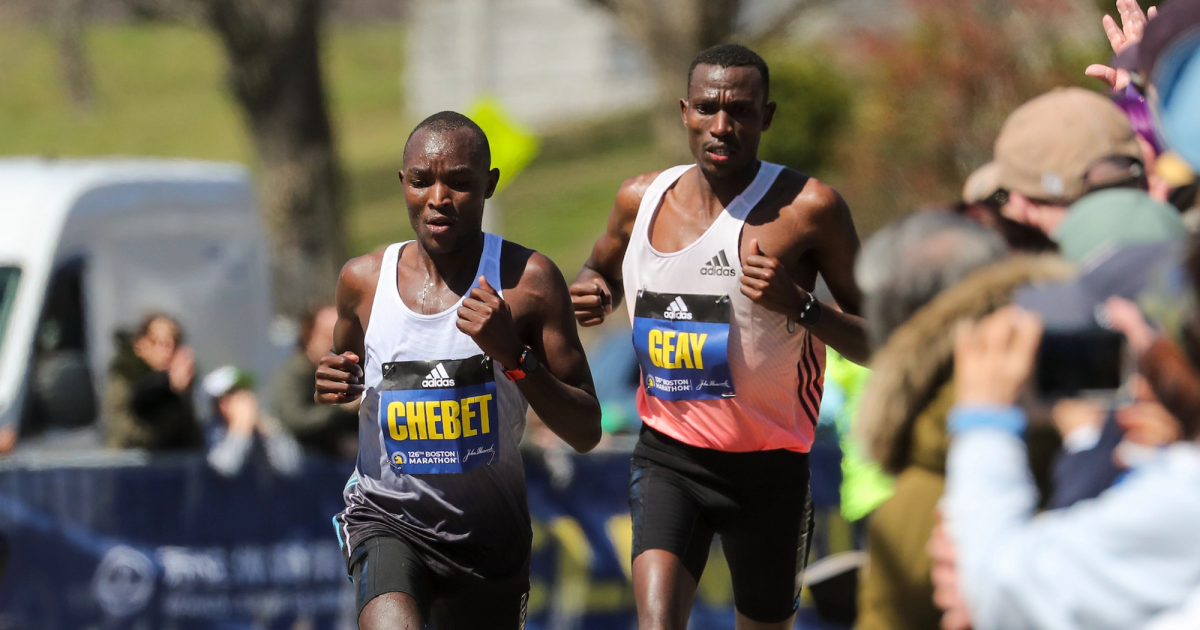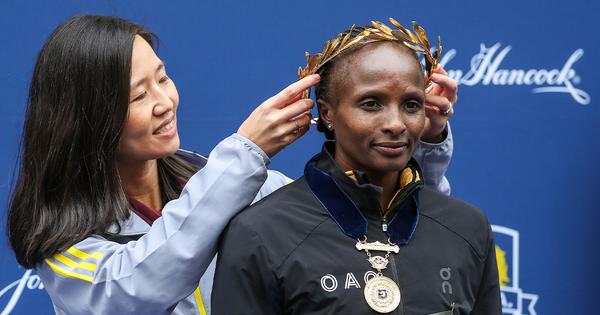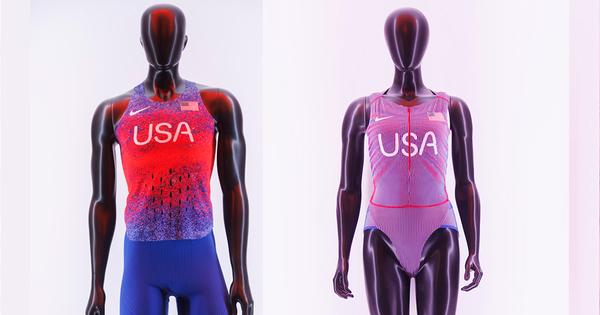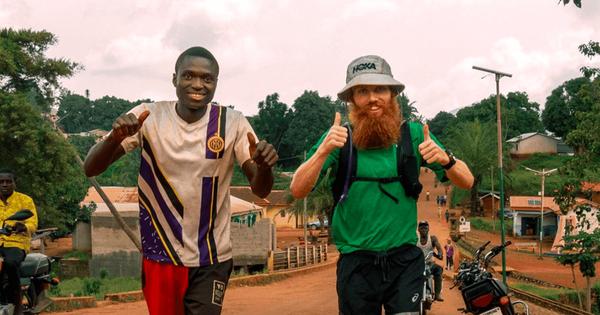By Owen Corbett
April 13, 2024
Marathon Monday is soon approaching, and an intriguing, under the radar storyline to focus on will be the performances of the Americans who are doubling back from the Trials back in February. One man who is looking for redemption from Orlando – and from his Boston debut last year – is Sam Chelanga.
We spoke with the 39-year-old before he took on the USATF 10-mile championships just eight days before he runs in Beantown (he ran 47:49 for 11th place and eighth among Americans). Chelanga opens up about his training with Conner Mantz and Clayton Young in the leadup to the Trials, his affinity for Boston, and why he switched up his race day breakfast.
CITIUS MAG: Before we talk about Boston, can you take me back to your last marathon, the Olympic Trials in February. I know it didn’t turn out how you wanted (Chelanga fell off the pace of the leaders just after 10k and did not finish the race, his last split was at 1:36:56 through 18 miles – 5:23 pace – in 139th place), what happened?
Sam Chelanga: I was fighting an illness. I don't know what it was, but I just know that I was sick back in December, and then I ran Houston January 14th, and I barely finished it. I think it was COVID, but when I went back and tested it, we didn't find anything. It just lingered, and I just had fatigue the entire way through [the Trials]. Because of the pressure, I thought I could pull it off because it was just such an important race that we've been working on, and training was going so well. But unfortunately, it didn't work out.
After that race, what went into the decision to come back and run Boston? Was that always the plan or did the plan change as a result of the race?
It changed as a result of that race. The way I work personally, I make adjustments based on the circumstances. I didn't foresee the Olympic Trials going the way it went, but just part of me – my resilience – was thinking, and I sat there and I said, “What can I do now?”
Part of me wanted to just let it go, then at the same time, I talked to Boston, and said, “I'm still not feeling good, but I'm trying to figure out what's going on.” I had some clues, I did some tests, I think I had COVID and at that point was just recovering. April is two or three months away, I think I can recover with the training that I've done and do this race. I just made that call on the spot. I talked to my coach, we knew Leonard [Korir] had finished third [at the Trials] and needed a time. I thought, I'll sign up for a marathon, maybe I can unlock that spot or something. It’s all just taking shots, that's just my philosophy, I just went with my gut.
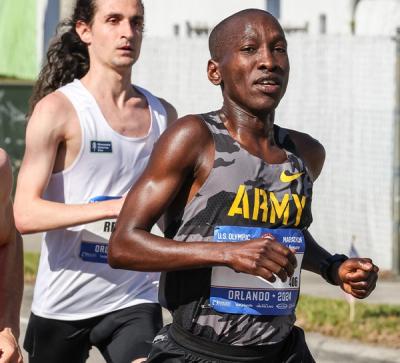
Kevin Morris/@kevmofoto
How has your training been going in the lead up to Boston?
Honestly, it's been relaxed. I told myself I wasn't going to pressure myself to try and get fit again because I was already under so much pressure from [the Trials] and that's been going well. If you take a laid-back approach, it clicks better than you would think.
So I'm going to do Boston, and I want to just have a good time. I'm trusting that the training that I did will help. I'm not gonna lie to you, I feel like I'm a little bit undertrained. I started my taper already, and usually, I don't even taper, so it's a very interesting situation.
I know leading up to the Trials you were training out in Provo, Utah, with Clayton Young and Conner Mantz under coach Ed Eyestone. Is that still your training set up now?
That was just a one-time thing because most of the people in my [training] group were gone. I still wanted to help them, and they still really wish me the best, but [for Boston] I just went back to Colorado where my work is, and I took the laid-back approach. I use some of the workouts that I did with them last year but I’m back with Army coach Scott Simmons. I told him I didn't want pressure, and he just told me, “You need to focus on recovery and enjoy life.” That's the approach that I'm using for Boston. We'll see how it goes.
Did you enjoy the training with Conner and Clayton and did it make the day a little better to see them finish one and two in the race?
Yes. It was probably one of the best build-ups I've ever had. We had a good time, even though those guys had families and they were busy, I feel like we got a lot of opportunities to hang and just enjoy the team atmosphere. I got to also experience a new training ground in Utah because Colorado – believe it or not – is not the same as Utah, that place is a little bit low in elevation (Provo, UT sits 4,551’ above sea level compared to Colorado Springs’s 6,035’).
It was a very fun build up and I was really happy to see them go one and two. At the same time, I could see them finishing and I was like, “man, I remember those runs that I just would have stayed with them, I think I could be right there.” I was happy for them though, and then one of the Army guys (Korir) finished third. Overall I've learned in life the process is more important sometimes than the end goal. I felt like I made great friends with those guys, and I watched them hit a milestone that we all would love, so I'm really happy for them.
That's awesome. On race day, when did you find out that they finished first and second and that Leonard finished third?
I was in the medical area, just hanging around. There was a jumbotron that I could see so I saw them coming through. There was actually a point where there was a U-turn on the course so when I dropped, Clayton saw me on the side and he was yelling at me to come back. He was like, “hey, hey, let's go!” I saw the two of them, they were like the same guy. I thought this guy is ready to go. And so when I saw them at the end, I wasn't surprised.
Back to Boston, I know you ran it last year and it ended up being a tough race in the second half (Chelanga positive split 65:34\74:46 finishing 30th). How do you think you can use your experience on the course going forward this year?
The best thing that I can take from last year is that it can't get any worse than that. If it does – which sometimes it does, so never be comfortable – then I don't know what to say because that's life.
Last year was interesting because I was injured. I got injured right after World Cross. So I went to World Cross and came back and did Sound Running (the TEN). After that I did a long workout and I just remember I had an injury on March 18th and it just lingered and lingered and lingered.
I remember I told Mary Kate [Shea, Senior Director of Professional Athletes for the B.A.A.], I didn’t know if I was going to make it. I don't know why, but she was very chill and said she would keep me in the race and I would let her know week by week if anything changed. I remember the last time I texted her was maybe ten days out and I had one more workout. The race was on Monday, I kept my flight, and told her I would let her know on Friday. So I got to Friday and for the first time my leg feels great, we did a six mile tempo at 4:50 [pace]. I told my coach, “are you seeing this? I really feel good. I just missed three weeks of training, but everything is now in one piece.” Coach Scott is another laid back person and he said, “you got your flights, got everything set up. Just go, man. Go have fun.”
I asked for it. I don't want to blame someone [for the bad race] because I told them that I want to go and he supported me. When I started the race, I was so nervous because it was the first time that I've done something long in almost a month. I found a good rhythm with Ben True (23rd, 2:16:06) and some of those guys. I honestly think part of it was also fueling because at that point I wasn't honed in on my fuel plans. I just remember I hit a massive wall at 30k, my leg was starting to feel aggravated just because of overuse. But I had so much fun because the crowds were cheering like I had never seen before. I’ve been to Boston so many times, but I never really realized how loud people were in every corner even towards the last six or ten miles. I thought of dropping and I said, there's no way I'm going to miss this, so I just jogged it in.
You mentioned that you’ve run in Boston a number of times (This will be Chelanga’s second time at the Boston Marathon in addition to running the B.A.A. Half four times, the 10k three times, and the 5k twice). What is it that you like about running those streets of Boston?
First off, my wife is from Plymouth. Also, I feel like I always had some turning points in Boston. I remember when I was a freshman, I ran with [Josh McDougal, 2007 NCAA Cross Country champion] and we were trying to qualify for [NCAA] indoors at a BU meet. You imagine that track? That track is legendary and it's been legendary for many years. I remember running with him and I talked to him and said, I need you to help me. My personal best was like 14:20 and I needed help trying to run the time for nationals. I said I'll take a few laps, he looked at me – he was a junior and I was just a freshman – and he said, just chill behind me and I'll help you. Long story short, I ended up running 13:46 on that day (McDougal ran 13:37 for the win), and I’ll always remember it was Boston.
I remember, when I went pro, the first race that was excited about me was the [B.A.A.] 10k. They said you need to come to our race, so I actually even ran with my college uniform because I didn’t have a contract. And then subsequently they just kept inviting me to the 5k, the 10k, the half. I have done so many races there and I moved back in 2012 or 2013 to go train with Ben True [in New Hampshire]. My family lived in Boston, we've gone to Fenway Park, and I used to follow the New England Patriots during the Tom Brady/Gronk era and those were the best times of my life. So that's why I would choose Boston any day.
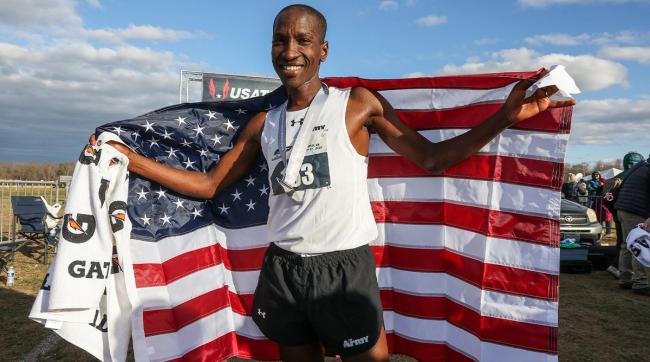
Kevin Morris/@kevmofoto
You're a frequent presence on the USATF Road Championships circuit, which takes you all around the country. Where is your favorite place (outside of Boston) that running has taken you in the US?
That's a tough question because New York Road Runners, they treat you really well and they put together good events, but I'm going to go ahead and say the 20k championship [in New Haven, CT]. I can't explain to you why. [John Tolbert, a Board of Directors member for the race] would message me, “Hey, Sammy, you coming?” and I'll know it's that time again. He tells me the same thing every time, that if I finish top five I get free travel. I have nothing to gain, it’s just for fun, and I'll say, “I'll see you on Labor Day.” I have never been outside the top three in that race, but I’ve never won in five tries. I’m always in tip top shape when I’m there, I remember in 2017 it was one of my best races and last year it was one of my best races. I would say another that I really like is the ten miler in the Twin Cities, but I feel like I have a connection with JT so much that I think [the 20k championships] is probably one of my favorite races.
Keep in mind, this is a tough question because you’re going to offend somebody. But I'll say the B.A.A., New York Road Runners, and Chicago, you can't beat those people, they’ve got the budget. I had amazing times in those places but there's something in my gut, and that's what I'm going with.
So now let's take an even bigger picture. I know just last year you got to run World Cross in Australia and you got to run the Pan Am Games in Chile. Where is your favorite place that running has taken you in the entire world?
I ran the London Marathon and that was cool, but I really had a terrible race. I went to Valencia and ran the half marathon World Championships, that was great.
This is really hard. I am going to go ahead and say one of the funnest places that I went is, Melbourne, Australia. I went there in 2013 (for the Zatopek 10k), and met a guy named Dave McNeill (Australian record holder in the indoor 5k until 2021). I stayed with his family, and we drank a lot of tea and I was there long enough to learn a little bit about the city.
You mentioned that you ran both USA Cross and The TEN last year, but you didn’t run either of them this year. Is that just a result of being all in on the marathon right now?
I was bummed out not to run Sound Running, but with the sickness, I don't like to go to a race where I know the [pace] is 27:00 when I don't feel ready, and this year I just didn't feel like I was ready. When I chose the workload that I did in December/January, I knew it would translate more to a marathon than a track race. To be honest with you, I go by the decision that feels the best based on the information that I have, and I estimated that going to Boston was the best option. The [TEN], I have gone there so many times and I've done all right, but this year we just decided to pass. I don't know why, but it just felt like the right decision.
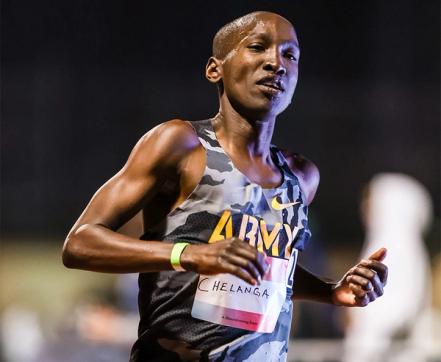
Kevin Morris/@kevmofoto
Speaking of The TEN, Nico Young took down your collegiate record in the 10,000m (Chelanga’s record of 27:08 had stood since 2010). How did it feel to see it finally go down?
To be honest with you, I am super proud of Nico. It's just one of those things where it happened to me, I never planned it, so I don't know how much he went in trying to break it. I broke that record twice, I took it from Galen Rupp, and then I lowered it myself. Now Nico has taken it under 27:00 14 years later. When I saw the times on X (formerly Twitter), my jaw dropped. Those guys ran that fast, I was like, whoa, this is college?! I just think that the game has changed, I congratulate Nico for moving the game forward. I feel so bad for young people in the future, you're going to break that record?
Well when you did it, you obviously didn't have the pace lights or the super spikes and [Chelanga jumped in]...
Yeah, but I don't really focus on that. I don't believe in that idea of the technology. I think every generation executes to the best of their ability with what they have. I don’t think that we should really compare, because you can’t take away the fact that if you go watch the race that I was part of when [Chris] Solinsky broke the American record, it was clutch. It was an awesome race. You could almost argue that it was more exciting than the pace light way because we had never seen [an American run under 27:00]. Even some of us who were racing it would finish and ask “what did he run?” It was so exciting.
I ended with the fourth fastest time in the world at the end of the year (Chelanga finished third in the race). That's how monumental that race was for us and for the rest of the world. But nowadays, I don't know if it's technology or just the way that human beings move forward, guys are running those super impressive times now. I'm just really happy that guys like Nico took advantage of what they have because at the end of the day, that race was there and only two collegiate guys had the guts to come and do it. It just goes to tell you, if you are present at the right time, you never know what's going to happen.
What does the plan look like for the rest of the summer? Will you be ready to hop on the track and go for the 10,000m at the Trials?
Honestly, I've been debating that question for a while. I have qualified for the 10,000m and about a month ago I thought, should I not run Boston and focus on the track? But I just feel at this point that I put so much time into my other 10,000ms, and my legs just don't have much speed. You might see me run the 10,000m, but right now, I just want to pick races that I enjoy. I'm not the kind of person that says I have to make the Olympics. I have put myself in so many situations like that where it's an Olympic season, and then you just end up putting all your eggs in one basket and shooting yourself in the foot. I don't play that game anymore. I just want to sing my own tune. If I want to run the 10,000m, I'm going to do it for my own reasons, I'm not going to care what people think about me. I even thought about maybe running a mountain race. I ran Mount Washington last year and it was sick, maybe I'll do it again.
This summer, I'm going to go back to my work. For the next two years, I'm going to be training for my new career in the military. You will definitely see me running fun races throughout the summer but not July. In July I have school that I have to go to. Then probably in September and October you'll see me again.
I know that you had a soft retirement from track back in 2018. What pulled you back into the sport?
It's a long story, but I was stationed in the Eglin Air Force Base in Florida, and there was a group that my wife used to run with, but not me. One of the guys asked me to pace him for a Trials of Miles race (which Chelanga said kept people alive during Covid). One of the things that I did when I retired was I ran seven miles every day during my lunchtime so I was still fit. So I paced this guy and they were shocked. They said I needed to run with them but I said I was retired. I told them I would train with them for the Army 10 miler but they would have to help me. They brought a bike to help me and I remember I felt so good, and I ran in the 48s, we were flying.
I ended up winning the race and when I went back to work the next day, somebody had called our boss and he came looking for me. We were doing some training in the woods and I saw these people that looked like VIPs. I went to talk to them because I was a lieutenant. It was the deputy commander of our Special Forces group. He said, “I watch track and field every time on NBC. I watch the Olympics. I actually know of you. I just didn't know that you were here.” He convinced me to run the 10,000m at the Olympic Trials the next year in 2021. He said it would be a cool story and he would help with my training schedule. I would go in the morning to meet my platoon and tell them where to go, and then would go train.
My wife told me I have a talent that I was sitting on. “A lot of people would die to have what you have, you should give it a try.” Within months I went from zero to running sub-13:40 [for 5000m]. At the Trials, I ran 27:42 and finished eighth. I never looked back.
I'd be remiss not to mention your amazing race at the Chicago Marathon last year (Chelanga ran a PB of 2:08:50 for ninth place). Can you kind of tell me what went right on that day and how you can apply it to Boston on Monday?
What went right for me most importantly was nutrition. Training was good too, but I finally found a gel that I like and how often I like to take it. Even at [the Trials], I was excited because I had a good formula that I know if I stick to it, I’ll do well. Another thing that I changed was instead of focusing on long runs where I would go 40k fast, I tried to do 30k at 5:10 pace at 6000’. My best was 20 miles at 6000’ on a dirt road at 5:12 pace.
Wow.
Pretty solid. I wish that was the day of the marathon, maybe I burned myself out.
One more fun question for you, it ties into nutrition. On the website for the 2024 Trials, one of the questions asked your favorite breakfast and you said yours was a bagel. But on the page for the 2020 Trials in Atlanta, you said oatmeal. So what breakfast are you rocking before you run Boston?
I knew that someone would have caught that. I used to eat oatmeal and for short races, it’s awesome, but for a marathon I found that a bagel would settle my stomach better. When I have a light breakfast like oatmeal, I’d burn through it in like two hours and all I’d have left an hour after I’d start taking gels was sugar. I would just start just crashing because there's too much sugar in my stomach, so I tried the bagel and it worked. You can catch me eating a bagel on Monday in Copley Plaza in Boston.
Thank you Sam for your time. Good luck in Boston!
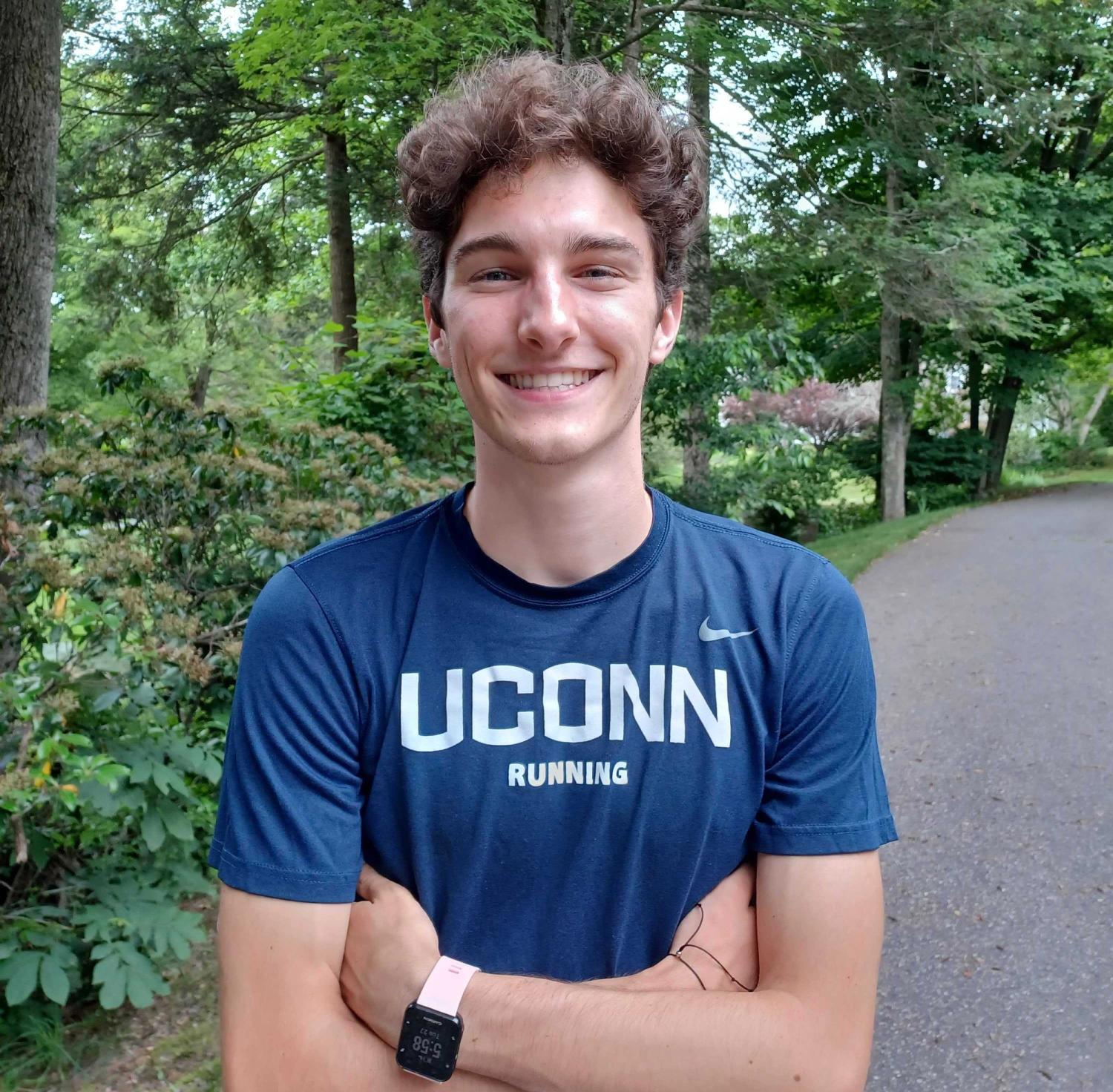
Owen Corbett
Huge sports fan turned massive track nerd. Statistics major looking to work in sports research. University of Connecticut club runner (faster than Chris Chavez but slower than Kyle Merber).
